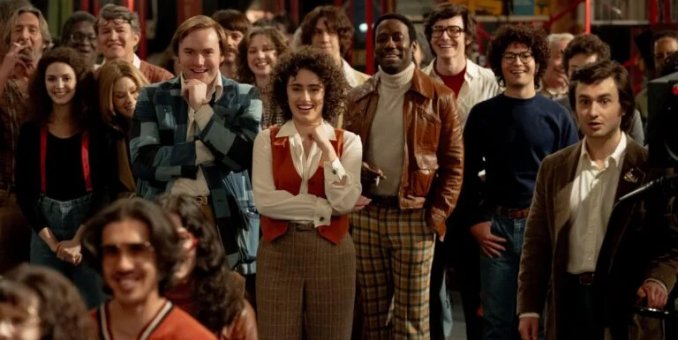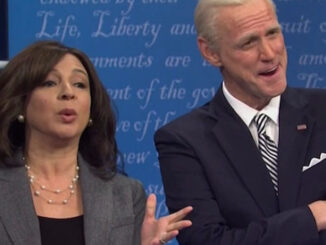
Director Jason Reitman’s film tells a (highly) fictionalized account of the last hour and a half before that first episode would broadcast live from NBC’s 30 Rockefeller Plaza studios in New York. As perhaps expected, it is a chaotic 90 minutes, with the young turks of comedy coming up against the old guard of the production crew whose careers stretched back two decades of staid network programs. The show has far more material than it needs for that first show and Michaels is under pressure to cut it down to fit the time slot. The studio was touted to him as state-of-the-art while he finds it completely inadequate for the type of show he envisions. It is a race to get things ready by 11:30 when the show is set to go out to the nation, a literal race against a ticking clock.
Much like the real Lorne Michaels assembled an amazing roster of writers and actors for the show, Reitman has pulled together a cast that very much embodies the original cast, writers and crew. Reitman’s camera zooms through the famed Studio 8H and the floor where the writers work, darting in and out of moments, giving his cast specific moments to shine. these are all puzzle pieces that come together to form the story of that night.
But if you are looking for an accurate historical reenactment of the 90 minutes leading up to the historic first broadcast, you won’t find it here. The screenplay actually takes many issues that were playing the show in the weeks up until that first episode, and collapsing them down to this much smaller timeframe. It does so in a way that all occasion does strain credulity just a bit. Much of the issues we see Lorne wrestling to solve as the clock ticks down towards the 11:30 airtime didn’t crop up at the last minute so much as were rolling issues that were encountered in the weeks leading up to the show’s first broadcast. Many were solved on that day, but often hours, not minutes, before airtime. The Chevy Chase – John Belushi antagonism may have been brewing, but perhaps not in the exact way we see here. Belushi famously did not sign his contract until the last minute, but when he did, it was in circumstances far different than portrayed here. Milton Berle was not in 30 Rock shooting his own special at the time of broadcast. Writer Alan Zweibel wasn’t hired that night. Writing team Al Franken and Tom Davis were probably not pitching the famous blood-squirting Dan Aykroyd as Julia Childs sketch in the hallway at that moment. The list can go on and on.
But Reitman doesn’t seem ultimately interested in reconstructing that evening verbatim, even though he and co-writer Gil Kenan did interview a number of cast and crew as research for the film. Instead, we get an impression of not just the birth of what would become a comedy institution, but of its midwife, Lorne Michaels. We see how he solved these problems, stood firm in the face of network executives meddling and molded what would become one of the defining comedy institutions in pop culture. And while yes, it may come off as hagiography at times, the film does paint an entertaining and portrait of much of what Michaels had to deal with to get the show on the air. Just don’t squint to hard at the details.





